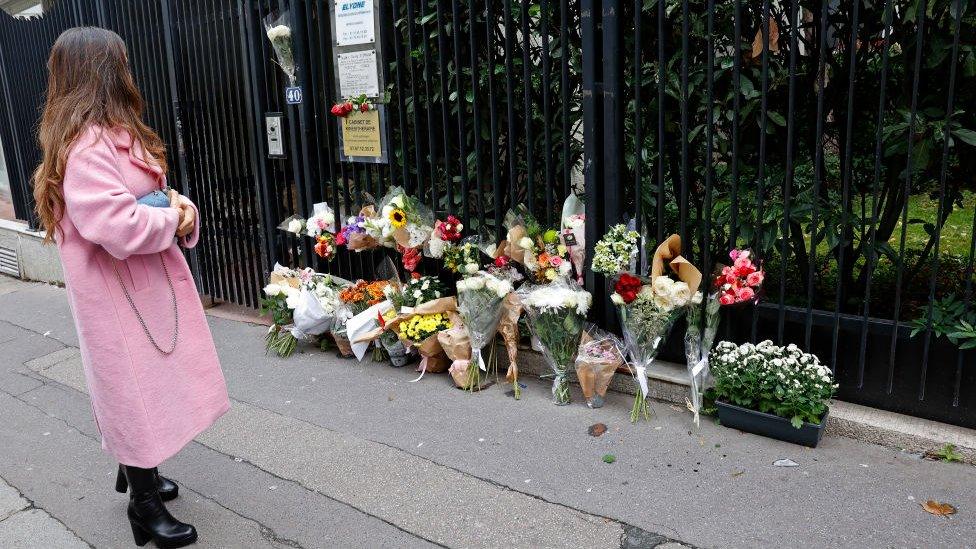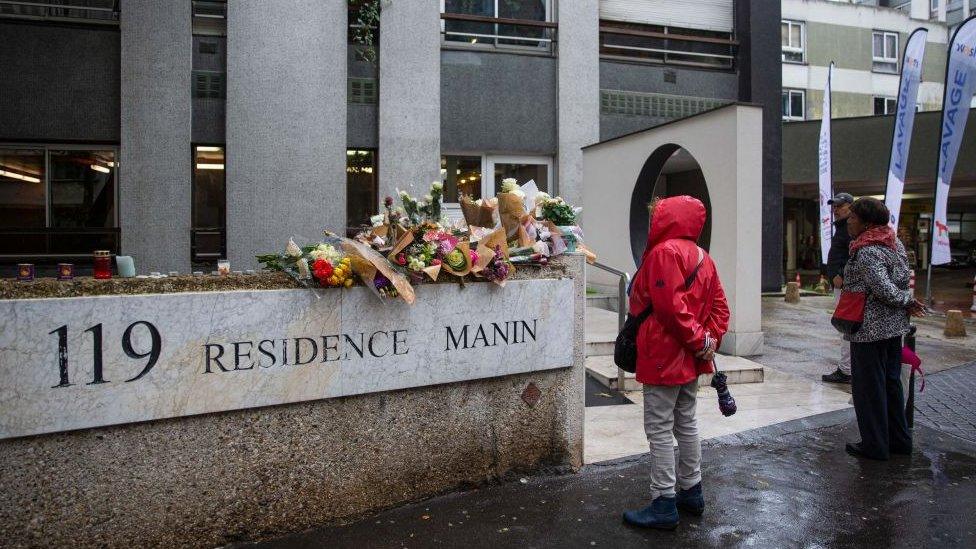Paris murder: Killing of Lola, 12, sparks immigration row in France
- Published

Lola's body was found hours after she was killed in the 19th district of north-eastern Paris
Grief and outrage in France over the murder of a 12-year-old girl found dumped in a plastic trunk in Paris has turned into a political row over the migrant status of the suspect.
Lola's body was found last Friday in a courtyard outside the apartment block where she lived.
A 24-year-old woman has been remanded in custody on suspicion of murder, rape as well as acts of torture.
It has also emerged she is an Algerian immigrant under orders to leave France.
Shortly after President Emmanuel Macron met the murdered girl's parents at the Élysée Palace on Tuesday and promised his full support, political opponents on the right and far right accused the government of failing the family.
During an animated session in the National Assembly, Marine Le Pen of the far-right National Rally party condemned the government's "lax" migration policy.
"The suspect in this barbaric act should not have been in our country; what's keeping you from finally putting a stop to this uncontrolled, clandestine immigration?" she said.
Prime Minister Elisabeth Borne appealed to her to "show a little decency" and respect the parents' pain and Lola's memory, saying: "Let the police and judiciary do their job."
Lola disappeared last Friday after failing to make the short walk home from school in the 19th district of north-east Paris. By late evening her body had been found inside a trunk on wheels.
A post-mortem examination found she had suffered cardiorespiratory failure "with signs of asphyxiation and cervical compression". Wounds were found to her face, back and neck but had not led to her death.
As her father is the building's caretaker, he soon retrieved CCTV video showing the suspect, Dahbia B, with his daughter in the hall of the block of flats on Friday afternoon. A man aged 43 has been accused of helping to hide the girl's body.
The government's political opponents have been quick to highlight Dahbia B's status as an illegal immigrant.
She was initially stopped at a French airport on 20 August because her residence permit had run out. She had entered France legally as a student six years ago. Dahbia B was told to leave French territory within a month, under an order known as an OQTF (obligation de quitter le territoire français).
Although some orders are more immediate, Dahbia B had no criminal record so she was not placed in detention. OQTF orders are notorious because only one in 10 are observed, and Algerians are among the nationalities considered most likely to abuse the system.
Interior Minister Gérald Darmanin appealed to the far right to reflect on the consequences of their words, after far-right former presidential candidate Éric Zemmour labelled the crime a "Francocide", or the killing of a French person. There was, the minister told RTL radio, a great deal of indecency in some of the political responses.
Several other figures on the right were also critical of the government, with Republican MP Éric Pauget telling the justice minister that "Lola lost her life because you didn't expel this national".

Lola was last seen alive in the hall of her block of flats
Mystery surrounds the motive behind the killing and the suspect's lawyer has condemned the various rumours circulating locally. The Paris prosecutor has revealed that a figure one and a zero were written under the victim's feet, but have not suggested why.
One potential motive cited by sources close to the investigation is a dispute between the main suspect and Lola's mother. Dahbia B had been living in the same building with her sister but when she asked for a pass to enter the block of flats Lola's mother refused.
The suspect is being held in isolation at Fresnes prison, south of Paris. Reports suggest she was a victim of domestic abuse several year ago and she is due to undergo a psychiatric examination.
A silent protest in tribute to Lola has been called off on Wednesday after a request from the family. However, a rally is expected to take place the following day, at which several far-right politicians are expected to take part.